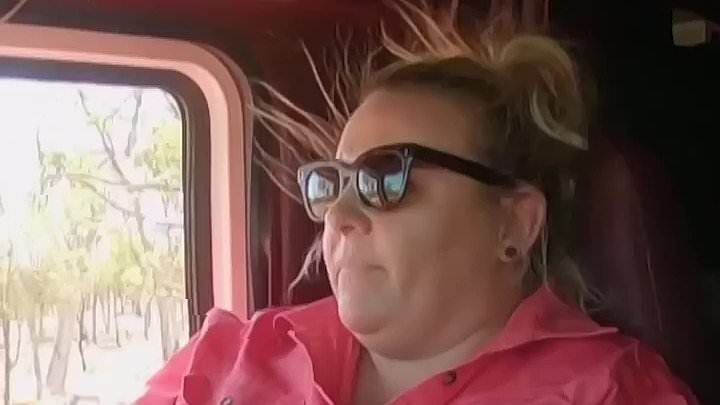Confronting dashcam of a truck driver hitting two baby kangaroos in broad daylight has sparked a fierce debate over high speed wildlife encounters.
The clip first aired on Channel Seven program Outback Truckers five years ago showed trainee driver Kylie Hornick behind the wheel of a road train under the supervision of an instructor.
A kangaroo and two joeys suddenly emerged directly in her path.
‘Keep it straight, keep it straight,’ the instructor repeatedly said as the adult kangaroo narrowly escaped the fast-moving truck.
A loud thud was heard as the two joeys disappeared under the hood of the truck.
‘Yuck!’ Ms Hornick said.
‘I hate that sound but I’m not going to jeopardise oncoming traffic [and] our lives for one kangaroo.’
The clip resurfaced this week and was reposted by Macquarie Driving School, a NSW-based heavy vehicle training company which educates and raise awareness about the hazards of wildlife collisions.
‘Imagine this: You’re driving a heavy truck at high speed on a busy highway. Suddenly, two baby kangaroos jump onto the road,’ the company captioned the footage.
The school advised swerving or breaking suddenly would only endanger road users while staying on course was ‘heartbreaking, but it may be the safest option’.
‘Don’t matter what animal mate, never swerve to avoid, and you won’t be touching the break at that speed for one either,’ one YouTube viewer wrote.
Doing so may have been particularly perilous, given a ute was driving at a fast speed in the opposite direction
‘Situations like these are part of the job,’ the school wrote.
While many viewers – including a number of truck drivers – agreed the trainee had done the right thing, some accused her of driving recklessly.
‘If you slow down, you won’t jeopardise anyone,’ one commented.
Another described the incident as ‘just awful,’ claiming she should have slowed down.
One man caused a particular stir when he wrote: ‘Pro tip – if you take your big hoof off the accelerator the vehicle will actually slow down.’
A woman replied: ‘Ever driven a big rig? With a comment like that it’s a firm no!’ while another said: ‘Slowing down a road train with about 20m warning… Good luck.’
Kangaroos account for the vast majority of wildlife collisions in .
About 12,880 animal collision insurance claims were lodged with NRMA in 2023, 85 per cent of which involved kangaroos.
Animal welfare group WIRES advises motorists to stop and check on the welfare of injured animals if it is safe to do so following a collision.
‘If the animal is alive and injured call WIRES or your local wildlife rescue service,’ campaign manager Kristie Newton said.
‘If the animal has died due to road trauma – especially if it is a kangaroo – check if it is a female and if there’s a joey(s) in her pouch or around her.’
